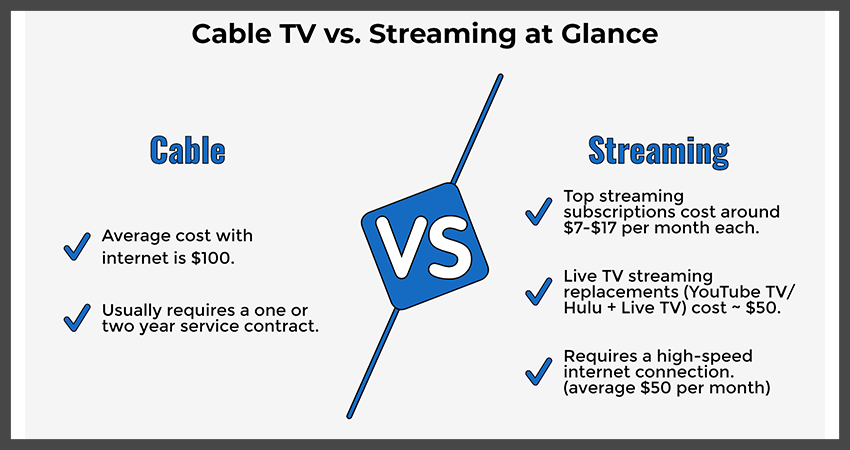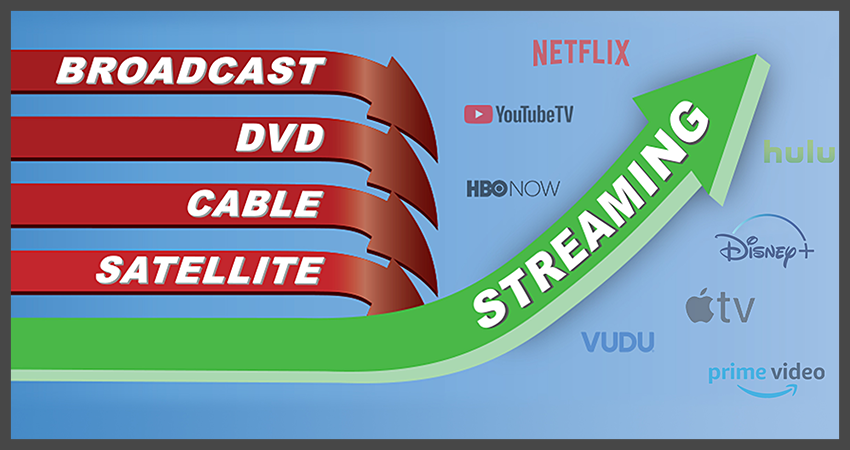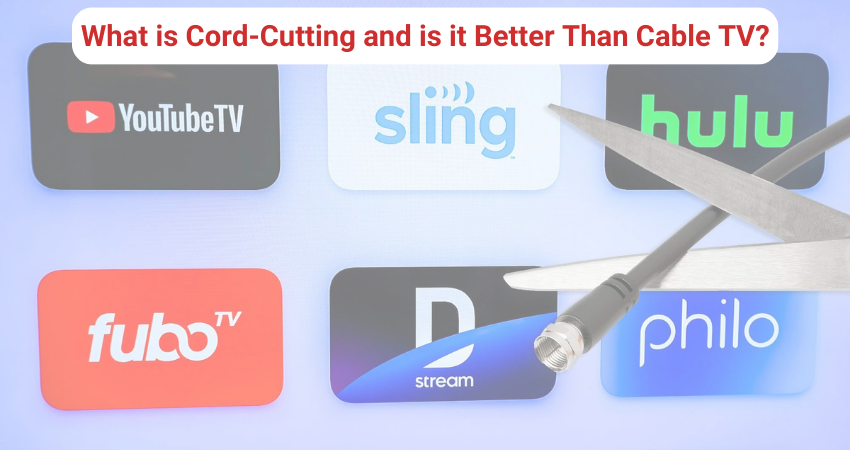In the world of home entertainment, the battle between cable and streaming services continues to rage on. As consumers, the question we’re left with is, “Cable vs streaming: which is the better option?” In this comprehensive guide, we’ll delve into the pros and cons of both options, explore the costs associated with each, and provide you with practical tips to make the decision that best suits your needs.
Understanding Cable and Streaming Services
Before we delve into the nitty-gritty of cable vs streaming, let’s first understand what each term means.
What is Cable TV?
Cable TV is a traditional method of broadcasting television content through a network of cables. It offers a wide variety of channels, including news, sports, movies, and local programming. Some cable providers also offer bundled services, combining internet, phone, and TV packages for a discounted rate.
What is Streaming?
Streaming, on the other hand, refers to the digital distribution of television content, movies, and other media over the internet. Streaming services such as Netflix, Amazon Prime, and Hulu allow you to watch your favorite shows and movies on-demand, from any device with an internet connection.
The Great Debate: Should I Get Rid of Cable?

One of the major questions many consumers ask is, “should I get rid of cable?” The answer largely depends on your viewing habits, budget, and personal preferences. Here are some factors to consider:
Content Availability
One of the significant advantages of cable TV is its extensive range of channels and content. However, it’s also important to note that many streaming services offer exclusive content not available on cable TV. Shows like “Stranger Things” on Netflix or “The Marvelous Mrs. Maisel” on Amazon Prime are only accessible through these respective platforms.
Cost
Is streaming cheaper than cable? On the surface, it might seem so. However, the reality is more complex. The cost of streaming can quickly add up, especially if you subscribe to multiple services. On the other hand, cable TV packages can be expensive, particularly if you opt for premium channels.
Convenience
In terms of convenience, streaming services win hands down. You can watch your favorite shows and movies anytime, anywhere, on any device – a flexibility that cable TV simply cannot offer.
Is Cable Better Than Streaming?

While streaming services offer convenience and unique content, there are scenarios where cable might be the better option.
Sports Content
If you’re a sports enthusiast, cable TV might be a better fit. Many sports events, particularly local games, are not available on streaming platforms. Live sports coverage can be challenging to find on streaming services due to exclusive agreements between broadcast networks and sports teams.
Channel Surfing
If you enjoy the experience of flipping through channels, cable TV is the way to go. While some streaming services offer live TV options, they can be more expensive than standard streaming packages.
Multilingual Programming
For those who enjoy watching content in different languages, cable TV may offer a wider variety. Although some streaming platforms provide foreign TV shows and movies, finding specific content, especially live TV in different languages, can be challenging.
Cable vs Streaming: A Cost Comparison
In the debate of cable vs streaming, cost is a crucial factor. So, let’s break down the costs associated with each.
Assuming you subscribe to popular streaming services such as Netflix ($9.99 for basic, $19.99 for premium), Amazon Prime ($14.99), Disney+ ($7.99), and ESPN+ ($9.99), your total monthly cost would be around $42.96 for basic subscriptions and $52.96 for premium ones.
On top of this, you need to consider the cost of high-speed internet, which can range from $60 to $100 per month, depending on your provider and plan. This brings your total monthly cost to anywhere between $102.96 and $152.96.
Comparatively, the average monthly cost of a cable TV bill in the U.S. was reported to be $217.42 in 2020, often including discounted internet access or phone service as part of a bundle.
The Bottom Line on Cord Cutting
Is cutting the cable cord a wise financial decision? Yes, for most households, cutting the cord can result in significant savings. However, it’s crucial to consider your viewing habits and preferences. If you love watching live sports, enjoy channel surfing, or need specific multilingual content, cable TV might be a better fit.
In the end, the decision between cable vs streaming boils down to a balance of cost, content, and convenience. Evaluate your options carefully and choose the one that best suits your entertainment needs and budget.
How to Save Money After Cutting the Cord
Here are some practical tips to keep your streaming expenses under control:
- Bundling Services: Some streaming providers offer bundle discounts. For example, Disney+, Hulu, and ESPN+ offer a combined subscription for $14.99 per month.
- Annual Subscriptions: Consider paying for a yearly subscription upfront for a discounted rate.
- Take Advantage of Promotions: Keep an eye out for promotional offers. For example, HBO Max offered a 40% discount on ad and ad-free subscriptions in October 2022.
- Use an Antenna: For local channels and live TV, consider investing in an HD antenna to access free broadcasts.
- Student or Senior Discounts: Some streaming services offer discounts for students and seniors.
The Future of Home Entertainment: Cable vs Streaming
The future of home entertainment is rapidly evolving, with more and more households shifting towards streaming services. However, cable TV is not going away anytime soon, particularly for viewers who prefer live TV, sports, and multilingual content.
As we navigate through the ever-changing landscape of home entertainment, the ultimate decision of cable vs streaming will continue to depend on individual preferences, budgets, and viewing habits. Whether you decide to cut the cord or stick with traditional cable, make sure it’s a choice that provides the best value and enjoyment for you.
FAQs
What is the difference between Cable TV and Streaming services?
Cable TV is a traditional method of broadcasting content through a network of cables, offering a variety of channels. Streaming refers to the digital distribution of content over the internet, allowing you to watch shows and movies on-demand from any device with an internet connection.
What factors should I consider when deciding between cable and streaming?
Consider the following factors:
- Content availability: Cable TV offers a wide range of channels, while streaming services offer exclusive content.
- Cost: The cost of streaming can add up if you subscribe to multiple services, while cable TV packages can be expensive.
- Convenience: Streaming services offer the flexibility to watch content anytime, anywhere.
Is Cable TV better than streaming in any scenario?
Yes, Cable TV might be a better option for sports enthusiasts as many sports events are not available on streaming platforms. Also, if you enjoy channel surfing or watching content in different languages, cable TV may offer a wider variety.
How can I save money after cutting the cable cord?
Here are some tips:
- Bundling Services: Some providers offer bundle discounts.
- Annual Subscriptions: Consider paying for a yearly subscription upfront for a discounted rate.
- Promotions: Look out for promotional offers.
- Use an Antenna: For local channels and live TV, consider investing in an HD antenna.
- Student or Senior Discounts: Some services offer discounts for students and seniors.





